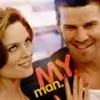Originally posted by: aromal
i just thot over it and..
1) Rowling said in an interview Harry and the "creature" find themselves in a sort of limbo, between the world of the living and the afterlife. We may say Harry's neither living nor dead. This "limbo" may function - IMO - as a sort of "Room of Requirements": Harry here can choose whatever he wants. He can still choose between life and death, and it looks like his desires are immediately fulfilled. He asks for clothes and he gets them; since his greatest desire is to know the truth from Dumbledore, Dumbledore arrives.
2) Harry's body remains in the Forest. Harry arrives at the limbo with a sort of "metaphorical" body - and he's naked, since he gets clothes. But I think his nudity is also symbolic: it may represent the pureness of his soul, which could journey to the afterlife, if Harry wanted to.
3) The "creature" is the piece of Voldemort's soul which is still in his body. (When Harry awakes in the following chapter, Voldemort is lying unconscious, so maybe he has journeyed to the limbo, too.) Harry feels sad for it because he sees what Voldemort has chosen to be. I think it could be a reference to a sort of hell, to the destiny Voldemort has shapen for himself. His soul is twisted, tormented and restless because he has never known love or remorse. Voldemort is beyond DD and Harry's help because he doesn't want to be redeemed.
4) DD explains that the "limbo" has taken the form of King's Cross exclusively for Harry. What DD and Harry share in that chapter happens in the depths of Harry's mind (or in his soul, if you like), and everything mirrors Harry's personality and feelings. It's clearly a symbol: it's the point from which Harry can depart towards the afterlife, or towards the ultimate fight with Voldemort. It makes sense for it to be a railway station.(hmm, is this a possible English sentence structure?!? forgive me if it isn't) Besides, King's cross was the place where Harry's adventure in the wizarding world began (The Hogwarts Express...). It's a curious parallelism that here he has to make the definitive choice.

























